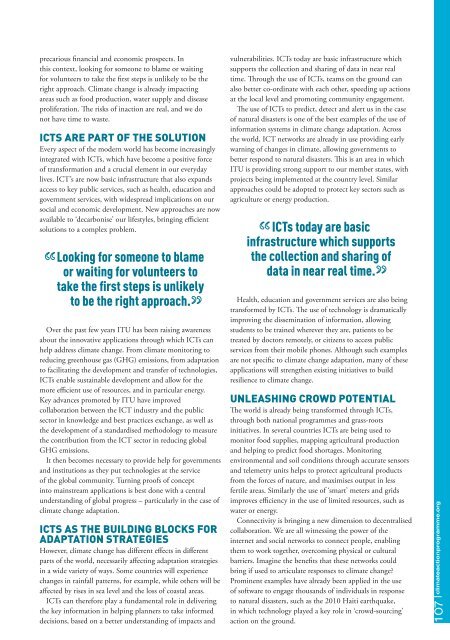Climate Action 2011-2012
You also want an ePaper? Increase the reach of your titles
YUMPU automatically turns print PDFs into web optimized ePapers that Google loves.
precarious financial and economic prospects. In<br />
this context, looking for someone to blame or waiting<br />
for volunteers to take the first steps is unlikely to be the<br />
right approach. <strong>Climate</strong> change is already impacting<br />
areas such as food production, water supply and disease<br />
proliferation. The risks of inaction are real, and we do<br />
not have time to waste.<br />
icTS are parT of The SoluTion<br />
Every aspect of the modern world has become increasingly<br />
integrated with ICTs, which have become a positive force<br />
of transformation and a crucial element in our everyday<br />
lives. ICT’s are now basic infrastructure that also expands<br />
access to key public services, such as health, education and<br />
government services, with widespread implications on our<br />
social and economic development. New approaches are now<br />
available to ‘decarbonise’ our lifestyles, bringing efficient<br />
solutions to a complex problem.<br />
Looking for someone to blame<br />
or waiting for volunteers to<br />
take the first steps is unlikely<br />
to be the right approach.<br />
Over the past few years ITU has been raising awareness<br />
about the innovative applications through which ICTs can<br />
help address climate change. From climate monitoring to<br />
reducing greenhouse gas (GHG) emissions, from adaptation<br />
to facilitating the development and transfer of technologies,<br />
ICTs enable sustainable development and allow for the<br />
more efficient use of resources, and in particular energy.<br />
Key advances promoted by ITU have improved<br />
collaboration between the ICT industry and the public<br />
sector in knowledge and best practices exchange, as well as<br />
the development of a standardised methodology to measure<br />
the contribution from the ICT sector in reducing global<br />
GHG emissions.<br />
It then becomes necessary to provide help for governments<br />
and institutions as they put technologies at the service<br />
of the global community. Turning proofs of concept<br />
into mainstream applications is best done with a central<br />
understanding of global progress – particularly in the case of<br />
climate change adaptation.<br />
icTS aS The building blockS for<br />
adapTaTion STraTegieS<br />
However, climate change has different effects in different<br />
parts of the world, necessarily affecting adaptation strategies<br />
in a wide variety of ways. Some countries will experience<br />
changes in rainfall patterns, for example, while others will be<br />
affected by rises in sea level and the loss of coastal areas.<br />
ICTs can therefore play a fundamental role in delivering<br />
the key information in helping planners to take informed<br />
decisions, based on a better understanding of impacts and<br />
vulnerabilities. ICTs today are basic infrastructure which<br />
supports the collection and sharing of data in near real<br />
time. Through the use of ICTs, teams on the ground can<br />
also better co-ordinate with each other, speeding up actions<br />
at the local level and promoting community engagement.<br />
The use of ICTs to predict, detect and alert us in the case<br />
of natural disasters is one of the best examples of the use of<br />
information systems in climate change adaptation. Across<br />
the world, ICT networks are already in use providing early<br />
warning of changes in climate, allowing governments to<br />
better respond to natural disasters. This is an area in which<br />
ITU is providing strong support to our member states, with<br />
projects being implemented at the country level. Similar<br />
approaches could be adopted to protect key sectors such as<br />
agriculture or energy production.<br />
ICTs today are basic<br />
infrastructure which supports<br />
the collection and sharing of<br />
data in near real time.<br />
Health, education and government services are also being<br />
transformed by ICTs. The use of technology is dramatically<br />
improving the dissemination of information, allowing<br />
students to be trained wherever they are, patients to be<br />
treated by doctors remotely, or citizens to access public<br />
services from their mobile phones. Although such examples<br />
are not specific to climate change adaptation, many of these<br />
applications will strengthen existing initiatives to build<br />
resilience to climate change.<br />
unleaShing crowd poTenTial<br />
The world is already being transformed through ICTs,<br />
through both national programmes and grass-roots<br />
initiatives. In several countries ICTs are being used to<br />
monitor food supplies, mapping agricultural production<br />
and helping to predict food shortages. Monitoring<br />
environmental and soil conditions through accurate sensors<br />
and telemetry units helps to protect agricultural products<br />
from the forces of nature, and maximises output in less<br />
fertile areas. Similarly the use of ‘smart’ meters and grids<br />
improves efficiency in the use of limited resources, such as<br />
water or energy.<br />
Connectivity is bringing a new dimension to decentralised<br />
collaboration. We are all witnessing the power of the<br />
internet and social networks to connect people, enabling<br />
them to work together, overcoming physical or cultural<br />
barriers. Imagine the benefits that these networks could<br />
bring if used to articulate responses to climate change?<br />
Prominent examples have already been applied in the use<br />
of software to engage thousands of individuals in response<br />
to natural disasters, such as the 2010 Haiti earthquake,<br />
in which technology played a key role in ‘crowd-sourcing’<br />
action on the ground.<br />
107 climateactionprogramme.org












